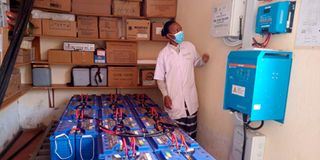No more births in the dark as clinics get solar power

Jacinta Malemba shows off the solar power connection at Ndilidau Dispensary in Taita Taveta County.
When Jacinta Malemba, a clinical officer in charge of Ndilidau Dispensary in Taita Taveta County was executing her duties sometime last year, the night sky had almost no illumination.
An expectant woman was wheeled into the maternity room escorted by her husband. As the mother tried to push the baby out, the power went out. Panic was written all over the faces of those in the room. With no back-up source of power, Jacinta and her colleagues used a torch to light up the room. Luckily, the baby was successfully delivered, but the struggle with the dim light was something she always remembers.
Now, the situation is better, thanks to solar technology. “It is like a dream come true,” says Jacinta. “This facility serves 12 villages with over 8, 000 people. We have been struggling with the unsteady electricity for a while. Even though we have not lost anyone, we have been risking.”
The power outages were so frequent that every time night fell, Jacinta and her colleagues hoped that either Kenya Power would spare them, or no patient would come just after power went out. Sometimes, their prayers were answered, but mostly they were disappointed, threatening quality service. The blackouts would last even more than five hours. “This hospital has had a number of miracle babies. Anytime they are born during the unsettling conditions, we call it a miracle,” she says.
The maternity wing of the dispensary can host 13 mothers if all beds are full. In a community that is still learning to embrace maternal care and child delivery in hospitals, the challenges brought by power outages kept some of the women away from the hospital.
Linda Mama
“Before a mother even gives birth, they have to come for antenatal visits. When some of them came and required services such as photocopying of their documents, sending them elsewhere was such a put off. Most of them did not come back,” explains Jacinta.
The more pregnant women the hospital lost by sending them away, the less cash it received from the Linda Mama free maternity programme.
“We cannot claim any money from Linda Mama if we do not have evidence that a woman was at the hospital. The money goes a long way in helping us run some of the activities at the hospital,” Jacinta explains.
Despite the regular power interruptions, the power bill still had to be paid, and every month, the hospital paid at least Sh10, 000.
Being a dispensary, caesarian sections are not conducted, but other hospital activities were still paralysed by blackouts. In the maternity room, a suction machine, a resuscitation kit and an autoclave machine used in sterilising key hospital equipment could not function without electricity.
Jacinta tells Healthy Nation that the only option they had back then was to take their equipment to the Taveta District Hospital for sterilisation.
Asthmatic patients
“Even asthmatic patients could not be helped because the nebuliser machine that they use requires electricity. We could not even carry out blood and urine tests,” she says.
Julius Mkare, a nursing officer at Rekeke Dispensary, is familiar with Jacinta’s tribulations. He says that a dim room hampers nurses’ effectiveness and it is traumatising for a family member who has never experienced a birth in circumstances where there is no electricity.
“It is a scenario that I hoped never to be in, imagine being alone and a child needs resuscitation yet there is no power. One can easily mess up, and unless they are innovative,” he explains. Some reagents used in hospitals also go bad if the refrigerator remains off for hours.
“We buy reagents according to the budget. Say we use about Sh30,000, if they go bad, that is a big loss to the community,” he says.
He adds: “Last year, there’s a period we experienced a blackout every two days. It was hectic, we were even forced to turn mothers away.”
Since a World Wide Fund Kenya project funded by BMZ-German Federal Ministry for Economic Cooperation and Development brought solar power to the two dispensaries, healthcare services have been going on without disruptions.
Electricity
“Provision of electricity is a key driver for development, especially in health centres and schools. For health centres, this has enabled storage of vaccines and other drugs that need to be stored at regulated temperatures, and effective operation of most of the lab equipment,” says Dr Yussuf Wato, Head of Science, Research and Innovation at WWF-Kenya.
Healthy Nation finds Diana Mvumwa at Ndilidau as she waits for her appointment. She is diabetic.
“I am happy that I do not have to go far to be taken care of. Before the solar installation, I used to come here and I would be turned away because there was no power,” she says.
“As an organization that is sensitive to climate change, WWF has provided solar power to these institutions as a means of promoting the use of renewable energy and thus decrease the impact on the climate,” adds Dr Wato.
Renewable energy expert, Raymond Yogo says that considering the remoteness and dispersed nature of the target population, as well as the terrain of the county, the use of solar technology is important in driving electrification. Embracing renewable energy, he says, will help in closing the energy accessibility gap.
“Remote areas in Kenya’s underserved counties with energy demand too small to justify the fixed cost of extending the grid should get connected at an affordable cost to spur economic activities at the micro-economic level,” he advises. To effectively invest in renewable energy, Yogo says the government should adopt two strategies: competitively award expansion grants and debt financing solar service providers.



